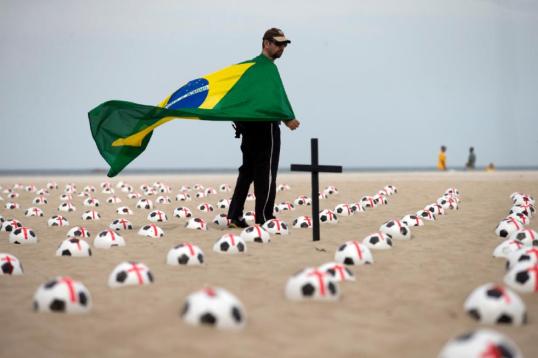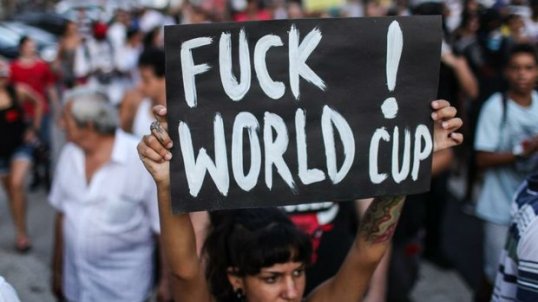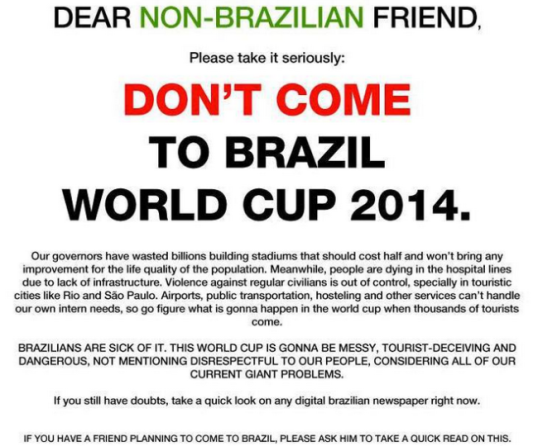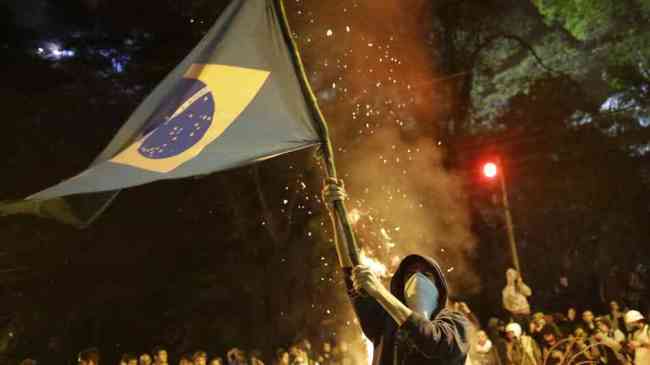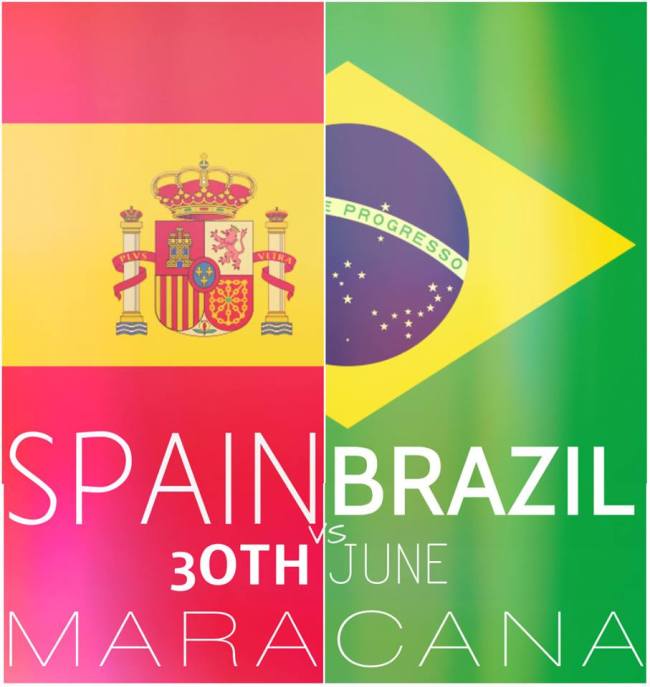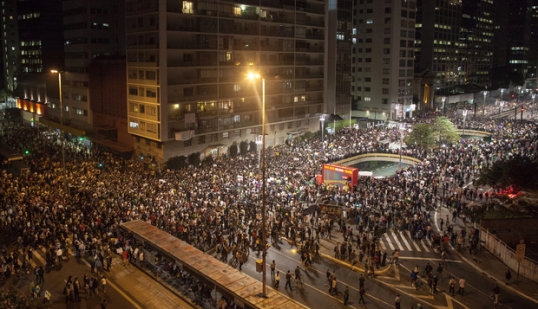Lost Sambista
A Brazil never seen.
Archive for the tag “2014 FIFA World Cup”
The war against the World Cup and the Olympics
It must be strange for people who are used to see Brazilians as a smiley and youthful nation, proud of its country’s sporting exploits, to learn that most of them are hating to host the Olympics and the World Cup. While the costs are astronomical and no one knows for sure who actually benefits from these soulless mega-events centred on big business, very few countries get the privilege of hosting them and doing so usually is a matter of big national pride. Brazil seems to be an exception, and the question that comes to mind is why.
Ask the average Brazilian and he will give you the standard answer: The anger is because the government decided to throw money on these useless events instead of investing in hospitals, schools and infrastructure. You will also hear accusations of corruption together with some strange complaints about the ruling Workers Party’s (PT) programs for instituting financial help packages for poor families who send their children to school and for allowing Cuban doctors in the country to work in areas where urban middle class doctors refuse to go. What also will strike as strange is that the discontent took years to surface and that the apparent lack of investment in infrastructure has been happening since the 1970’s and only now have Brazilians awakened to this fact.
However, whoever bothers to study the numbers closer will be surprised at what they reveal. The 8 Billion Reais ( 3.6 billion US dollars ) spent of the construction of stadiums is tiny when compared with the 825 Billion Reais spent in the health system since the works began while the investment in education only in 2014 is predicted to be 115 Billion Reais. This is without taking into consideration that there will be a return on the investment in the both mega events, not only with the selling of tickets and with tourism but also in jobs and in the construction of infrastructure related to the events and the rippling effect that economic activities always have.
Havinf got this out of the way, the question remais, where does this anger come from? Ask an angry Brazilian if he would be happy if the Olympics and the World Cup would happen under another government and he will most probably say yes. He will also say probably say that, as a matter of principal, he has nothing against these mega-events taking in his country; what he doesn’t like is the government that is handling it nor the way it is doing it. Which kind of government would he like instead? Not sure, but definitely not this hateful PT one.
Based on the above, we can say with a degree of certainty that the problem is with the Government and not with the events per se. If this is so, we have to ask ourselves what is so evil in the ruling party that makes people take the streets, and almost dedicate their lives on a political crusade against it? Corruption? Well… this has been a national institution for at least the past eight decades, and is due to the way the Brazilian economy works. The engineer of this mechanism was the dictator Getulio Vargas who started ruling Brazil in the 1930’s, and who stayed in power for more than twenty years. His strategy was to set up a strong interventionist government that would support the country’s development together with local capital. Simply put, this means that the government would come up with big projects such as setting up oil companies, constructing roads, building hydroelectric plants, ports etc… which would open opportunities for Brazilian and sometimes for international investors as well as generate jobs and stimulate the economy as a whole. In broad line this is similar to the American President Roosevelt’s New Deal and to the Marshall plan in post-war Europe. This all sounds great in paper, and Vargas set it up with the best of intentions, but the system would generate unlimited possibilities for corruption.
The reason for this is that the result is that the most important economic deals in Brazil are related to the government and who is heading it makes a huge difference in terms of which project will go ahead and who benefit from the, ultimately who will get rich and who will not. It is important to remember this and that although the PT is a left wing government and defends state intervention, this system was in place long before it ever ruled Brazil.
Some people will also blame the police brutality, not only towards the protesters but also, and mainly, towards the poor population on a daily basis. The police is there to serve the state so, according to this way of thinking; the exaggerated use of force would reflect the willingness of the PT to transform itself in a left wing dictatorship. This is worthwhile examining; the brutality of the Brazilian police dates from before the PT’s ascension to power, actually of its older members experienced this brutality when they were in the opposition. The public security forces’ ethos is an inheritance of Brazil’s slavery past and has traditionally been brutal. Also, with the exception of the elite Federal Police, they are under the control of local governments. In this context, they are almost self-serving organizations with a history of protecting the local powerful, and that are very hard to control from the outside. In fact, their greatest fear is being supervised by outsiders who could make them respond for their excesses, or at least limit them. As a corporation, they are by no means immune from corruption and tackling them is a touchy business that any government is the world tries to avoid. In any case, it is very hard to sustain that the interests of the police and of the PT are the same, and it would be insane to suppose that the Brazilian police would collaborate in installing a Left Wing dictatorship in the country.
The strongest argument against the Government is that it is using both the Olympics and the World Cup as a political card. There is an undeniable truth in this, but we point out that any political party in the world would. If things go well the opposition will look stupid and Dilma’s popularity will be restored. We do not hear this accusation so much because the opposition is using these mega events as much as they can to do anti-PT propaganda. They are actually using all the weight they can to promote an anti-Government crusade that now resembles a public lynching. The attacks are constant in almost all the media, social media included, and are vicious.
There is a war going on against the World Cup and the Olympics. The opposition is frustrated in realizing that the Government has absorbed most of the punches and is still set to win the upcoming elections despite the economic downturn and all the PR efforts against it. This discontent has set a wide portion of the Brazilian society to want these two mega-events to fail. They prefer the country to look bad in the eyes of the world and investors to run away, rather than to give support to a government that may damage some of their private interests. This reminds us of the story of the genie who comes up to a man and says. “Tell me what you desire and it will be yours, but bear in mind that your enemy will have double”, the man responds “Take out one of my eyes”.
So what is it in this government that they dislike so much? It is our view that what angers the middle class is that after more than ten years in the government the ruling party has privileged the poor rather than business. This is serious, as it was the more instructed Brazilians who put the PT in power and not the lower classes. These voters feel entitled to policies in their favour. While there has been an undeniable improvement in the standards of living of the poorest segments, in many cases over-taxation has made the middle class see their standards of living lower. One issue that is emblematic of this anger is that now households must treat domestic workers as office workers and must pay regular taxes to employ them.
As in most countries under left wing governments, people are paying high taxes but are not seeing this money return to them in services or any other benefits. The construction of big stadiums and the hosting of big events has been an easy target to catalyze this anger.
For us there are deeper layers to this war on the Olympics and on the World Cup. Internationally this is a moment of great changes. We have seen the US and its allies fail to impress the world with their invasion of Iraq and their intervention in Afghanistan. Although they have moved away from their failed tactics of direct intervention, it seems obvious to us that they have tried to cling on to their receding supremacy by using indirect pressure. By this we mean that they have incited and made allegiances with locals to carry out their strategies. The recent examples are plenty, some with happy endings and others with tragic consequences: Libya, Tunisia, Turkey, Syria, Iran, Egypt, Ukraine, Venezuela… What all of these countries had in common was the threat of abandoning the American “mentoring” and ended up having “spontaneous” uprisings, which were supposed to be sympathetic to the Western dominance.
In a time when Brazil has abdicated its status of being one of the darlings of global investors to become closer to emerging Russia and China via the BRICS, it would be reasonable to expect that the West would react. Brazil is by no means an insignificant country and its success or its failure, the paths it chooses, will affect the world’s power brokerage and relevant on how the international economic machinery develops. It is reasonable to believe that it would not only be the Brazilian political opposition who would benefit from a possible failure in the two biggest sporting events in the World?
In its quest to “deliver the goods” Brazil has two unlikely allies FIFA and the IOC. Both of these organizations are aware that over-commercialization is turning their events dull and are making a great effort to maintain a business as usual approach for the events to be a success. The IOC has already threatened to make the next Olympics in London, which is highly improbable, but FIFA is the one who has more to lose, if a world cup in Brazil, the country of football, is a flop they will not be able to do much to keep the audiences for the next one.
All in all, the heated debate on the advantages of a state administered economy versus one ruled by “business” that will happen in Brazil during the interlude of FIFA’s World Cup and the 2016 Rio de Janeiro Olympics promises to be more interesting than what will happen inside the stadiums.
Brazilian elite uses the World Cup to show their discomfort in being Brazilian
Great article!
A Brazilian Operating in This Area
 “Down with this underdeveloped Brazil.” That is how jeans-wear Ellus decided to engage with the World Cup — by putting that message in a shirt. I suppose they have a lame PR response, saying it is against the bottlenecks, not against the country. Still all Brazilians who understand our stray dog syndrome know what people who wear that shirt actually mean. After all, Ellus stores are attended mostly by folks who don’t use the public healthcare system. They don’t study at state schools. And they rarely set foot into public transportation in Brazil’s main cities (although they gladly do it abroad).
“Down with this underdeveloped Brazil.” That is how jeans-wear Ellus decided to engage with the World Cup — by putting that message in a shirt. I suppose they have a lame PR response, saying it is against the bottlenecks, not against the country. Still all Brazilians who understand our stray dog syndrome know what people who wear that shirt actually mean. After all, Ellus stores are attended mostly by folks who don’t use the public healthcare system. They don’t study at state schools. And they rarely set foot into public transportation in Brazil’s main cities (although they gladly do it abroad).
So what are they frustrated about? Are they as selfless as the activists who protest with an end in sight, whatever that end is? Or do wealthy Brazilians voice their criticism out of sheer boredom?
My answer is that rich Brazilians are frustrated for being Brazilian. And they poison the tone about…
View original post 1,481 more words
What are the protests in Brazil about?
While Brazil’s economic well being looks promising in the short and in the medium run, things have been strange in the political arena. Earlier this year, during the Confederations football Cup, there was a raging wave of protests while, under the surface, there is political unrest that may erupt during the World Cup.
Any uninformed person would jump to the conclusion that the protests come from the hungry masses who are discontent with the government for privileging big contracts instead of spending money on hospitals, education, housing etc… It is true that many are not happy but no, this is not where the anger is coming from. The discontent is coming from the middle and upper middle classes. The typical protester is a young, white male with a good level of education and no economic upheaval to deal with.
In other words, the protests are coming from the right rather than from the left. In general, the vast majority of the Brazilians, the working class, do not have strong reasons to protest, a proof of this is that there are very few working class people in the protests. The statistics show that there has been an improvement in their standards of living; more jobs, more education, more consumption… the list is long. They have benefited from the policies of the current left wing party, the PT, that has been in power for around a decade and that will most probably win the next elections.
So what are the protests about? Ask the average middle class Brazilian, and he will answer that they are about corruption in the government, more specifically among members of the PT. This is where the argumentation gets bizarre, they do not mention corruption in other parties, which in many cases is more severe than in the PT and if you listen closely, they will describe corruption as an exclusivity of the Lula and the Dilma governments, a clear fallacy for anyone who knows anything about Brazil.
There will also be the technocrats who will say that they are annoyed at the enormous presence of the State in the economy. They will defend Brazil adopting an economic model closer to the precepts of Wall Street and of the City of London: leave everything to private enterprise; they have the most qualified people and they know what they are doing. However, this is not what the protest are about, the young people in the streets do not carry neo-conservative nor monetarists flags. These arguments are only being heard now when the economy is beginning to dip. It was not so when Brazil paid their gigantic external debt, fixed the hyperinflation that corroded Brazil in the 80’s and in the 90’s and when it became the darling of international investors. In fact, the last time anyone heard these voices was when they gave terrible advice to the military regime in tackling the economic crisis. Everyone knows that if it were for these people Brazil would never have climbed out of that hole.
The question still begs an answer, what are the protests about? It is our understanding that they are about anxiety and powerlessness in the middle classes. The moralistic crusade, the hatred towards the left, the privileging of the technical over the democratic process reverts us to the rise of fascism and Nazism in the 1930’s. The country that the PT constructed during its large mandate has helped the rich to get richer and has taken a huge portion of Brazilians out of poverty. Meanwhile, the PT’s traditional voting base, the urban middle class, has not received the benefits of the economic growth. In many ways, they feel betrayed and are now worried about what will happen after the World Cup and the Olympic Games.
Justified or not, the poison is in the air. The protests were violent and there may be an escalation during the World Cup, when the embarrassment for the Government and the international exposure will be at its greatest. There are many questions: No one knows what this new right wants, not even themselves. All we know is that there is a lot of irrational anger and that they want the PT out. Apart from this, there is no party behind them nor do they have any leadership or any defined goal. Never the less problems may arise when some better organized group or power will appropriate this energy and use it for nonconstructive purposes.
Brazil vs Spain: a football showdown.
Tomorrow’s game is an important showdown for many football lovers. For some if Spain beats Brazil in the epicenter of Brazilian football passion, the Maracana, it be like the passing of the crown of world football dominance from Brazil to Spain. For others, if Brazil wins the match it will signify the coming of age of the Neymar generation where they will stop being a promise for the future and will become part of the Brazilian pantheon of football legends.
For the coach Felipao, or Big Phill, who has been in charge of this Brazil team for a little more than a month this will not be the ultimate test. He is a pragmatic man who is still building the team, his aim is winning the World Cup next year, not the Confederations Cup. When he won the World Cup in 2002 with Ronaldo, Ronaldinho, Roberto Carlos, Rivaldo et Cie, his team had been appalling in the qualifying stages and he attracted a lot of enmity by not calling up Romario, the country’s top scorer at the time.
For the Spaniards the game will mean a lot, it is the jewel that is missing in this amazing team’s crown, They have won the European Cup, the World Cup but not the Confederations one, and more importantly they have never beaten Brazil especially, and doing this in a world class final in the Maracana will be something that they hunger for. They want to brush off the questions regarding Brazil’s football superiority,
Despite Big Phill’s pragmatism, the Brazilians will also want to win, loosing a final in Brazil’s major football temple in front of a gigantic crowd would be a disgrace they would not want to live with, neither the players nor the coach. With players who are still seeking international consecration there is the added stimulus of ranking upgrade.
As for the game, Brazil and Spain have shown themselves similar in one aspect, they have “on” and “off” modes. When they are “off” they are vulnerable, nervous and make mistakes like any other team but when they are “on” they are unstoppable. The Spanish team has been playing together for longer and technically they are superior: more disciplined, more uniform in their talent and more seasoned in big competitions. But they have the disadvantage of coming from an exhausting game against Italy and many of the players will have the fear of facing the Brazilian yellow top in a competition.
As for our predictions; we think that Brazil’s “on” mode is wilder, less predictable and more creative which allied with the unique atmosphere of the Maracana will give Brazil the advantage. Brazil will win.
Brazilian protests – reflections on a confusion
The past weeks have been very revealing about where Brazilian politics stand. Although the rallies were not as big in size and in impact compared to decisive ones such as the Diretas Ja and the Fora Collor they showed what a large and influential portion of Brazilians are feeling about their politicians and their Government. President Dilma Roussef‘s camp now knows that before trying to project their country as an international power broker, there is still a lot of homework to be done.
The biggest novelty is that mixed with the denunciation of maneuvers that corrupt politicians have done to make themselves immune from public prosecution, discontent with overspending in the construction of Stadiums for the world cup and a plethora of other complaints that have accumulated over 10 years of Lula’s PT (Partido dos Trabalhadores) in power, there has been a strong right wing agenda of overthrowing the government lurking in the shadows. This anti-socialist sentiment has not been so strong since the days preceding Brazil’s military coup in 1964 and it is in the private comments and in postings in the social media that the true colors of what is happening have revealed themselves.
The fear of a government seeking to improve the conditions of its most destitute citizens, or worse representing them, is deeply entrenched among the Brazilian privileged who only five generations ago owned slaves. After the humiliation of having a working class president doing a better job than one of them in power by reducing social inequalities, by growing the country’s economy, by receiving international recognition and by indeed bringing the Olympics and the Fifa World Cup to Brazil; understating the achievements of the PT is no novelty in Brazilian wealthier circles. But now, as growth slows down it has become easier to rally public opinion from other classes and make up a critical mass to cause something significant and, who knows, bring the country back to its traditional class system while being subserviently attached to the “developed world”.
After years of relative tranquility, the left has also woken up and now in the social media and in the streets the debate is heated. So far the attacks, verbal and written only, have been against politicians and current and governments and we hope that the animosity will not escalate into hostilities between individuals or between organizations. Brazil has no history of civil war and its independence was granted by Portugal’s King in exile, so fighting to the bitter end for ideals is very rare. There have been internal armed conflicts in the past but they were either of militias against militias or, mainly, of the disorganized mass against government troops or in the sixties of paramilitary left wing cells against the armed forces.
Both the dangerous and the tranquillizing factors in this internal struggle lie in Brazil’s political immaturity. On the one hand, unlike the middle east, the demonstrations are almost a political continuation of the cathartic spirit of the football stadiums and of the carnivals. They are not angry despite the very rare cases of vandalism which are next to nothing when compared to what went on recently in London and a few years ago in Paris. The rallies happen in a good humored and family friendly environment, it is the educated middle class that frequents them after all. The danger lies in the naifness of protesting for one thing, against corruption, but being used for something else, topple the government.
On this topic we see a worrying tendency of wanting to overthrow the political class as a whole and install some kind of moral rule, which can only be compared to fascism or an Iranian style religious/moral autocracy. There are no political parties heading the protests only very suspicious “Anonymous” calls for actions, which makes us wonder who is ultimately behind these protests not only in Brazil but all over the world. These kind of world wide generic, internet based protests, that have caused political tragedies in the majority of the countries where they happened, are a new fact in Brazilian politics. We believe and hope that the young and far from perfect Brazilian democracy is solid enough to take the blow and will come out of this incident strengthened.
Brazil and the worst of capitalism
With big investments pouring into the country for the 2016 Olympics and the next FIFA World Cup, Brazil is facing a new and dangerous cycle as the one begun with the construction of Brasilia around sixty years ago. This is not a pattern exclusive to Brazil and we have seen it in European, African and Asian countries before.
What happens is that big money pours into a country that is “tagged” as promising and to maximize profits, the astronomical funds are dealt by their worst citizens, corrupt politicians and businessmen with no scruples or responsibility, who make fortunes and leave the rest of the country’s population with unpayable debts after the show is over.
We only need to take a look at what happened recently with the European Union, which only twenty years ago was labeled as the greatest business opportunity ever, or with what happened in Brazil several times before. We could not fail to mention Greece, who also hosted the Olympic games and now is in brink of total disruption. We wish the Brazilian protesters success and worry about the aftermath of Brazil’s current “Golden Days”.
